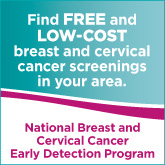Prevention and Screening

Some gynecologic cancers are caused by the human papillomavirus (HPV), a very common sexually transmitted infection. Vaccines protect against the HPV types that most often cause cervical, vaginal, and vulvar cancers. It is recommended for 11- and 12-year-old girls. (Note: The vaccine can be given to girls beginning at age 9.) It also can be given to females who are 13–26 who did not get any or all of the shots when they were younger. Ideally, girls should get three doses of this vaccine before their first sexual contact. If you or someone you care about is in this age range, talk with a doctor about it. (The HPV vaccine also is recommended for boys and young men.)
Screening is when a test is used to look for a disease before there are any symptoms. Cancer screening tests are effective when they can detect disease early. Detecting disease early can lead to more effective treatment. (Diagnostic tests are used when a person has symptoms. The purpose of diagnostic tests is to find out, or diagnose, what is causing the symptoms. Diagnostic tests also may be used to check a person who is considered at high risk for cancer.)
Of all the gynecologic cancers, only cervical cancer has a screening test—the Pap test—that can find this cancer early, when treatment can be most effective. The Pap test also helps prevent cervical cancer by finding precancers, cell changes on the cervix that might become cervical cancer if they are not treated appropriately. In addition to the Pap test, which is the main screening test for cervical cancer, a test called the HPV test looks for HPV infection. It is recommended to be used along with the Pap test for screening women aged 30 years and older. It also is used to provide more information when Pap test results are unclear for women aged 21 and older. Learn more about the Pap and HPV tests.
Since there is no simple and reliable way to screen for any gynecologic cancers except cervical cancer, it is especially important to recognize warning signs, and learn if there are things you can do to reduce your risk. Talk with your doctor if you believe that you are at increased risk for gynecologic cancer. Ask what you might do to lower your risk and whether there are tests that you should have.

Contact Us:
- Centers for Disease Control and Prevention
Division of Cancer Prevention and Control
4770 Buford Hwy NE
MS K-64
Atlanta, GA 30341 - 800-CDC-INFO
(800-232-4636)
TTY: (888) 232-6348
8am–8pm ET
Monday–Friday
Closed on Holidays - cdcinfo@cdc.gov



